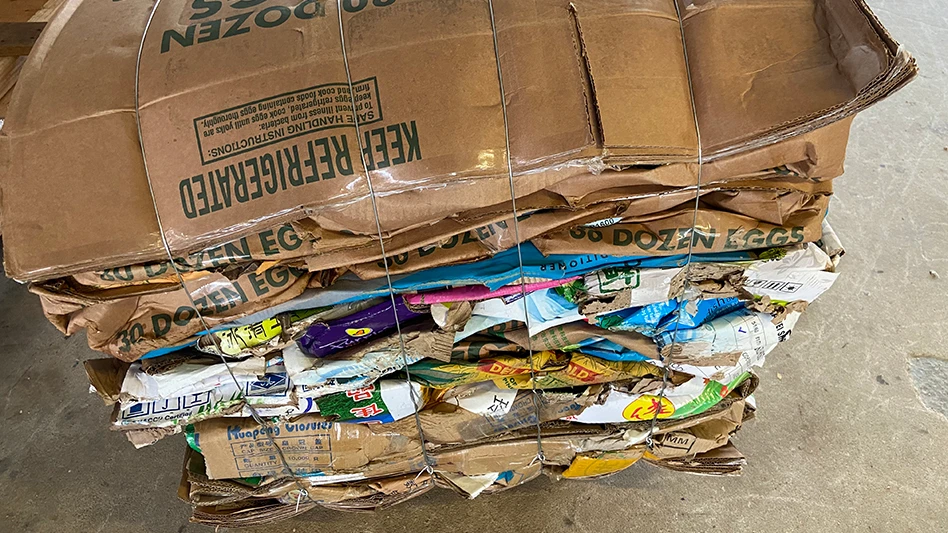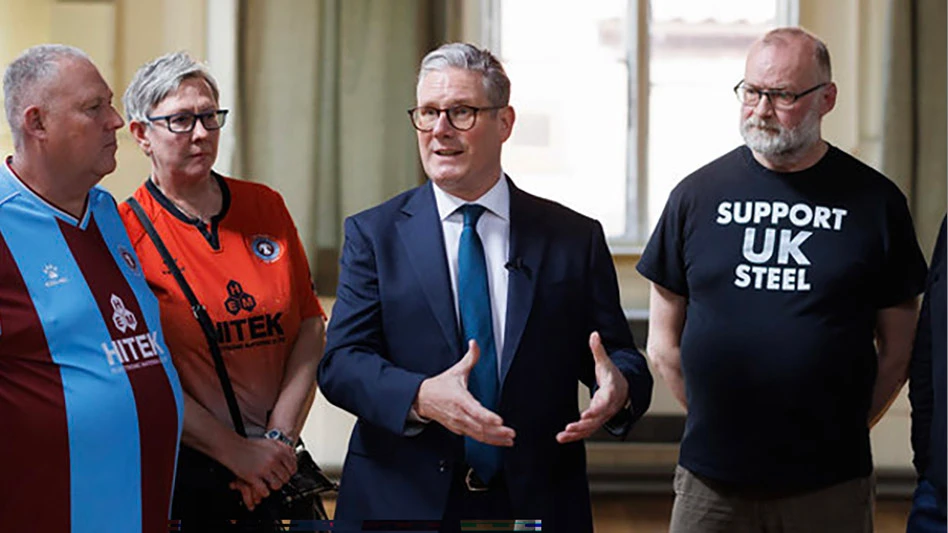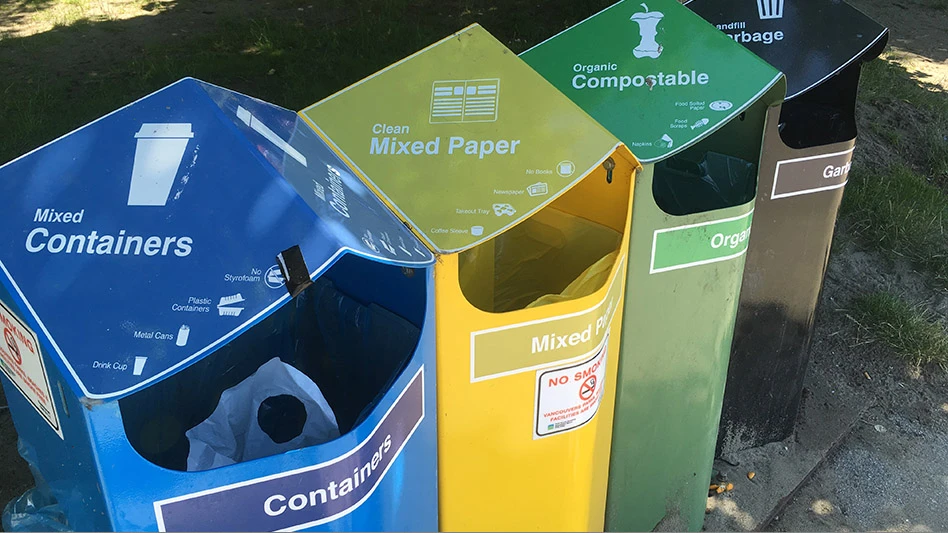 With commodity prices dropping significantly this year, sending shock waves through secondary materials markets, it’s no wonder some recyclers are on edge about business performance.
With commodity prices dropping significantly this year, sending shock waves through secondary materials markets, it’s no wonder some recyclers are on edge about business performance.
For recyclers in charge of publicly owned companies, the pressure to perform is that much greater. In that light, perhaps the line taken recently by David Steiner, CEO of Houston-based Waste Management (WM), is not that surprising.
Steiner got people talking earlier this year when he was quoted by various news outlets saying that recycling had become unprofitable and was approaching a crisis.
More than one recycler or industry observer stepped forward to dispute those claims.
Tim Brownell, co-president of Eureka Recycling, a nonprofit recycling organization based in Minneapolis, posted a statement on the organization’s website in which he took WM to task for indicting single-stream recycling while profiting from the landfill and incineration sides of its business.
And journalist Adam Minter, author of the 2013 book Junkyard Planet: Travels in the Billion-Dollar Trash Trade, helped bring the discussion full circle with a July Bloomberg View column stating that while the recycling industry may have hit hard times, it also must bear some responsibility for its woes.
Fast forward to fall of 2015, and the stance from WM hasn’t changed much. However, recyclers clearly are on both sides of the issue.
Now municipalities and processors may have to determine a path forward.
Real Challenges
Brent Bell, Waste Management’s vice president of recycling, speaking in September, points out that the publicly owned WM was not in a crisis, considering that its recycling business represents one-tenth of its revenue. However, Bell concedes, the company’s recycling business and the industry at large continues to face challenges.
“When you look at the sequence of events—low commodities prices, higher operations costs, contamination in the single stream and then the overall historical industry standard contract—it’s kind of led us to the point where the processors in the industry for recycling, especially single stream, have had a difficult time in making a profit in these times, and so I would agree that we’re definitely in a crisis state now.”
Bell says WM is pursuing a number of options, including efforts to renegotiate municipal contracts and close facilities if necessary. So far WM has contacted a majority of its contract holders to discuss the issues to arrive at a middle ground. He says some customers have been willing to work with WM. Those municipalities that do not or cannot do so are being advised that when their contracts come up for renewal, WM’s bids will be based on these factors, Bell says.
WM also has closed nearly 10 percent of its recycling facilities this year, he says, with some municipalities still in talks. “That number could increase if the talks don’t go well,” Bell adds.
While most recyclers agree problems exist within the single-stream system, they have various viewpoints on the positions WM has taken.
Ron Gonen, CEO and co-founder of the Closed Loop Fund, an investment fund backed by major consumer products companies committed to recycling their products and packaging, says he doesn’t believe recycling is in crisis, at least not when it comes to companies singularly focused on recycling.
However, for large waste management entities such as WM, he says, “I think there’s an inherent conflict of interest there.
“I understand why a company that owns a lot of landfills and gets most of [its] cash profit from landfills … may push the idea that recycling is in a crisis,” Gonen says. “But I think if you take a closer look at recycling, it’s more nuanced,” he adds.
Gonen argues that the markets for recycled aluminum, cardboard, office paper, polyethylene terephthalate (PET) and high-density polyethylene (HDPE) have performed well over the long term.
“If you look at a three-, five- or 10-year view for PET and HDPE, it’s been profitable to recycle.” Aluminum, cardboard and paper have as well, he adds.
What about the shareholders?
As a public company, profitability is concern for Houston-based Waste Management (WM). “We’re definitely looking for sustainable partners moving forward,” says Brent Bell, vice president of recycling for Waste Management (WM), referring to the company’s municipality customers. “But we have to do it in a sense where we can make money for our shareholders as well.”
Bell says the recycling side of its business accounts for one-tenth of the company’s revenue. A look at its dividends to shareholders and the price of its stock over the last decade indicates that long-term stockholders should be relatively pleased with the company’s performance.
The company has paid its shareholders a dividend every quarter since 2004, and those dividends have successively increased each year from roughly 19 cents per share in 2004 to 38.5 cents for the most recent quarter, paid Sept. 24, 2015.
Its stock price has gained significant value over that time, too. In 2004, WM stock sold for nearly $28 per share. That price has largely increased by 79 percent to its current level of approximately $50 per share, going as high as $55.14 in April of this year.
However, Gonen acknowledges issues are present. “The real crisis is in glass products and the contamination that comes into the MRF (materials recovery facility) that shouldn’t be in the recycling stream.”
Gonen says glass accounts for as much as 20 percent of the materials MRFs receive, but it isn’t profitable to recycle. “It weighs a lot, and it’s very hard to get rid of,” he says. (See the article “Breaking Through the Glass Ceiling,” beginning on page 102 of this issue, for Strategic Material’s Curt Bucey’s thoughts on the issues affecting glass recycling.)
Gonen asserts that contamination and glass issues have more to do with program collection and management policies than with recycling.
“The city or the hauler needs to do a better job of communicating to residents what can go into that recycling bin and what can’t,” he says.
On the other hand, Bill Moore, president of the Atlanta-based recycling industry consulting firm Moore & Associates and a former vice president of recycling for WM, says he believes today’s curbside recycling programs are suffering.
“The economic model and the pricing used to charge [for] those services has been too low,” Moore says.
“A second piece is the commodities market, which is at the low end of the commodities price cycle,” he adds.
Similarly, Ben Harvey, president of the Massachusetts recycling company E.L. Harvey & Sons, describes a certain reluctance among municipalities to share in the risks of processing single-stream materials, even after recyclers have invested heavily to do that. Harvey’s company, in the recycling business since 1911, began single-stream processing only two years ago, opening a new 250-ton-per-day MRF in 2013.
He says, “When all of us are spending millions of dollars to put this technology in and hiring people to do the work, and we have these anemic, depressed markets, it’s very difficult for us to sustain economic viability with the current formula we’re using.”
Yet some recyclers say that even in these difficult times, money can be made. One of them is Kerry Getter, CEO of the independent recycling company Balcones Resources, based in Austin, Texas.
Getter surmises that some in the industry may have strayed from the fundamentals over the years.
“The strength of the market was such that it essentially camouflaged many of the errors that were made,” he speculates.
Getter says Balcones remains profitable this year, despite the industry’s issues.
“We have made money in 21 of the 23 years that we’ve been in the business,” he says. “The two years that we lost money were in 1995 and 2009.”
Getter credits a long-term strategy to closely manage inbound and outbound materials and processing costs for some of Balcones’ success.
“You can’t live by commodity prices alone. You have to manage your commodity portfolio much like a bank manages its net interest margin,” he says. “You’ve got to maintain a margin, and there are pricing strategies to do that,” he says, citing preemptive policies and the use of penalties.
“We have an aggressive program on the front end in our receiving area,” Getter says.
Balcones examines every truckload of material, he says, notifying generators of contamination promptly and issuing appropriate penalties.
In addition, Getter says, “We don’t take any material into our facilities unless there is some sort of significant awareness or education program created around it.”
Another strategy, he says, is maintaining balance between residential and commercial materials and running these steams on separate lines to lower operating costs and prevent one stream from downgrading the other.
Still, Moore concedes, the contamination problem is one that largely caught single-stream recyclers by surprise, particularly with the advent of larger lidded carts.
“You get a lot of things that aren’t recyclable,” he says. “The participation rate goes up, the set-out amounts go up, but so do the amounts of contamination.”
Harvey agrees contamination, which damages equipment and creates disposal issues, is part of the problem.
“When we’re doing 300 tons a day, and 10-plus percent of that is waste materials,” he observes, “you’re running an hour just to process waste materials. If we could get that out of there, we’d all be much more efficient.”
Bell says WM is working to address contamination, in part by educating consumers through its “Recycle Often. Recycle Right” campaign.
In many cases, he says, municipalities weren’t even aware there was a contamination problem. “We found that municipalities for the most part like to know that we did have a contaminated stream and are willing to work with us to clean that up, and that’s part of the education program.”
WM also may step up efforts to impose penalties for excess contamination, Bell says, and may be able to offer a better rebate structure if glass is not part of the accepted materials stream.
Time to share the risk
If municipalities weren’t affected by the ups and downs of the commodities markets before, it appears they soon will be.
“We’re going in today and having conversations with those municipalities and saying, ‘The world has changed. Here’s the economic situation we’re in today,’” WM’s Bell explains.
He says that in the past, “we made a lot of commitments to these customers that were zero-floor, where they were not charged to recycle.” Today, however, the commodities risk and volatility must be shared between the processor and municipality, Bell says. “That’s what we’re seeing more of the industry doing.”
Harvey says, “I think if you have the ability to go back and renegotiate contracts, it is in the best interest of the industry, and in the best interest of the municipality to go ahead and do that.”
Bell and Moore say recycling industry customers have responded fairly well to contract renegotiations like those put forward by WM. “They didn’t get a lot of pushback,” observes Moore.
Getter says Balcones has a history of sharing the rewards of recycling with its municipal customers. “‘Share’ means you share in the upside and in the downside … We’ve written checks, in strong markets, for over a million dollars a month to people for buying their material.” He adds, “It’s time for them to share with us.”
The author is a managing editor with the Recycling Today Media Group and can be reached at lmckenna@gie.net.

Explore the November 2015 Issue
Check out more from this issue and find your next story to read.
Latest from Recycling Today
- Steel Dynamics nets $217 million on record shipments
- Massive Chinese steelmaking rebound recorded in March
- LME looks into sustainable metal pricing
- OnePlanet Solar Recycling closes $7M seed financing round
- AMCS launches AMCS Platform Spring 2025 update
- Cyclic Materials to build rare earth recycling facility in Mesa, Arizona
- Ecobat’s Seculene product earns recognition for flame-retardant properties
- IWS’ newest MRF is part of its broader strategy to modernize waste management infrastructure





